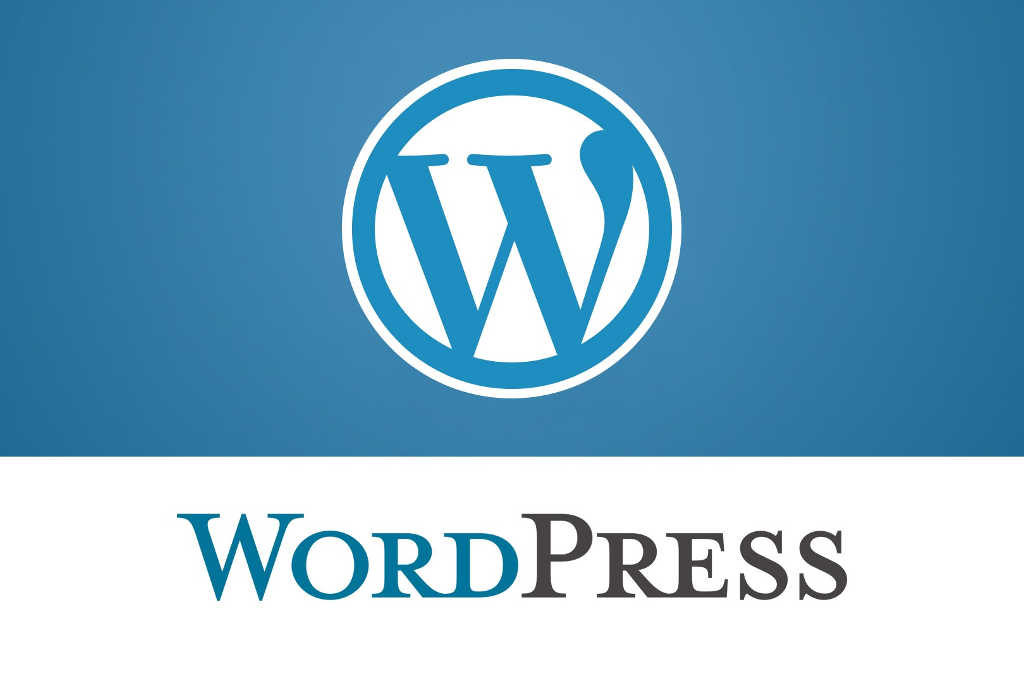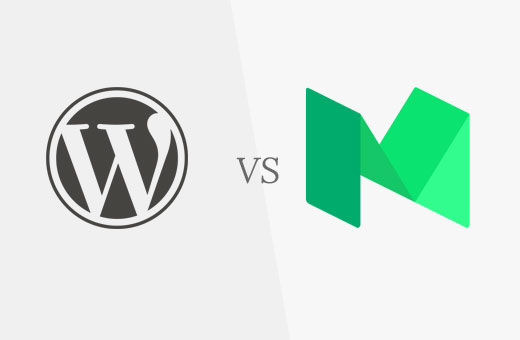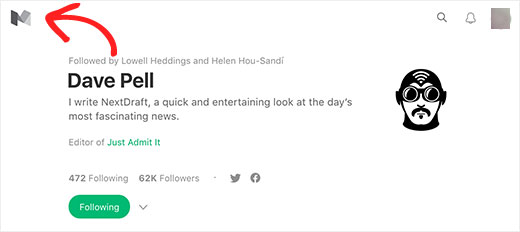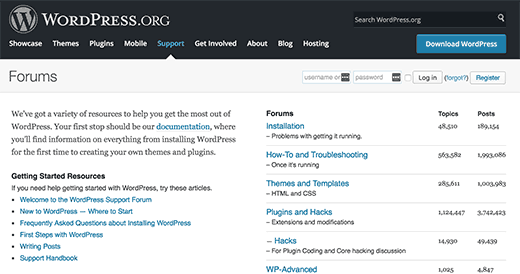Tech Listing Reviews, Website Platforms
WordPress vs Drupal: A Brutally Honest Comparison (the CMS battle continues)


When it comes to content management systems, there are two names that stand out: WordPress vs Drupal. Each has its own loyal community, a long list of popular websites that it powers, as well as a wide range of features and functionality.
It is common knowledge that WordPress is easier to use and more popular, as compared to Drupal that has a smaller community and a steeper learning curve. But apart from that, what really separates the two? In this article, I shall attempt to compare WordPress vs Drupal across a given set of fields.
Let’s have a quick introduction to the two players in this comparison. Obviously, both are content management systems. That means they give you a self-hosted solution to create and manage all of the content on your website.
So how do they stack up as content management systems?
WORDPRESS
WordPress is the world’s most popular content management system. Originally launched as a blogging platform back in 2003, WordPress now powers 29% of all websites and controls a massive 59.8% of the known content management system market.
Some notable examples of famous entities using WordPress for all, or part, of their web presence are:
Whitehouse.gov
Sony Mobile
University of Washington
Mercedes Benz
TechCrunch
The New Yorker
DRUPAL
Drupal has been around for even longer than WordPress, though it lacks WordPress’ gaudy market share. Originally launched in 2000, Drupal powers 2.3% of all websites and has a 4.6% share of the content management system market.
Some notable websites running on Drupal are:
University of Colorado
State of Colorado
The Economist
Dallas Cowboys
Nasa.gov
ADVANTAGES OF THE PLATFORMS
Let’s now compare their advantages to see how they stack up.
WORDPRESS ADVANTAGES
Ease of getting help – WordPress’ massive global community means that it’s easy to find support for any issues that you run into.
Lower development costs – WordPress offers more “out of the box” solutions and WordPress developers are usually more affordable than Drupal developers
Ease of use – WordPress is significantly more user-friendly, especially for non-developers.
Extensibility – WordPress’ third-party theme and plugin communities make it similarly easy to extend WordPress without the need for custom development. Some people even claim that, with the right extensions, WordPress can do anything that Drupal can do.
DRUPAL ADVANTAGES
Core support for multilingual sites – in Drupal 8, multilingual functional is baked into the core, whereas WordPress sites need to turn to third-party plugins.
Taxonomies for handling lots of data – Drupal’s taxonomy system is more flexible than WordPress, which can make it ideal for handling lots of content.
Custom content types and views – while WordPress does offer custom post types, most people consider Drupal’s custom content types to be a bit more flexible.
Access controls/user permissions – whereas WordPress single-site ships with 5 basic user roles, Drupal has a built-in access control system where you can create new roles with individual permissions.
Tips and Tricks, Website Platforms

Wondering which is better between WordPress vs Joomla? We’ve got this!
When it comes to building a feature-rich, scalable web site, not all content management systems (CMSs) are created equal. For large or complex projects, you’ll likely need more in terms of extensibility and security than drag-and-drop solutions that are designed to help non-developers get started quickly. If you need a CMS with more under the hood, you may want to check out Drupal or Joomla! They each require a little more technical expertise to set up and maintain, but they can more than make up for it if you’re building a complex site for a large organization.
Choosing just a platform for blogging might not be as hard as choosing the entire content management system that allows you to do more complex web projects. Casual bloggers who don’t ask for much can easily go for less complicated services, although WordPress should always be on top of the list when pondering over the platforms. But when it comes to entire content management systems that allow you to do much more than just writing posts, things become a bit more serious.
AN INTRO TO WORDPRESS!
WordPress is an online, open source website creation tool written in PHP. But in non-geek speak, it’s probably the easiest and most powerful blogging and website content management system (or CMS) in existence today.
What do TED, Flickr, The New York Times, Boing Boing, the Chicago Bulls, BBC America, Beyonce, The New Yorker, Vogue, The Rolling Stones, and thousands of other people have in common? They all made their official blogs and sites with WordPress.org. Launched in 2003, it doesn’t need any introduction except the long list of sites using it today and the fact that it powers almost one-quarter of the web.
Basically, you’re in good company if you use WordPress to publish on the web. Many famous blogs, news outlets, music sites, Fortune 500 companies and celebrities are using WordPress.
For example, famous blogs like Mashable and TechCrunch are both on WordPress. News outlets like The New York Times’ blogs and CNN’s on-air personality blogs all use WordPress, too.
If you’re ever curious about about who uses WordPress, head on over to the WordPress site showcase and you’ll be impressed by the number of well-known sites and famous people using WordPress to power their websites.
Often beginners ask us: Why should I use WordPress? Isn’t my old site good enough? Why do I need to switch to WordPress? If you’re asking these questions, then you’re at the right place. In this article, we have compiled a few reasons why you should use WordPress, in what ways you can use WordPress, and who is using WordPress.

People often make the mistake of classifying WordPress as just a blogging platform. Although that used to be true in the past, WordPress has evolved through out the years into a versatile content management system (CMS). While you can still use WordPress to create a simple blog, now it also allows you to create fully functional websites and mobile applications.
The best part about WordPress is that it’s easy to use and flexible enough for just about anything. That’s the main reason why WordPress has grown so much in popularity. According to a recent survey, WordPress powers 22.5% of all websites on the internet.
Due to it’s robust features, many of the top brands use WordPress to power their websites including but not limited to: Time Magazine, Google, Facebook, Sony, Disney, LinkedIn, The New York Times, CNN, eBay, and more.
Let’s take a look at why you should use WordPress.
WordPress is Free as in Freedom!
WordPress is a free software, this means you are free to download, install, use and modify it. You can use it to create any kind of website. It is also open source which means the source code of the software is available for any one to study, modify and play with.
There are currently 2600+ WordPress themes and 31,000+ plugins available for free. You can download, install and use them on any website.
To run WordPress, all you need is a domain and web hosting. We recommend using either Bluehost or SiteGround because both of them offer our users a free domain and 50% off their hosting prices. Check out our guide on why is WordPress free?

Due to the nature of open source, WordPress is a community software. It is maintained by a large group of volunteers majority of whom are WordPress consultants with active interest in growing and maintaining WordPress. Anyone can contribute to WordPress by writing patches, answering support questions, writing plugins, creating themes, translating WordPress and updating documentation.
By using WordPress you become part of that awesome community. You get free support from other community members, download free plugins and themes, and once you have little experience with WordPress you can even contribute back to the community.
WordPress Help, WordPress Support and Maintenance Services
However, running a successful website involves more than just what happens in the foreground. There is a lot of regular work required in order to keep the site ticking over, running at peak performance and perhaps most importantly, remaining secure from hackers and malicious scripts.
Admin tasks include keeping the WordPress core up-to-date, updating themes and plugins and ensuring there is a backup plan in action. Other areas include focusing on security and database optimisation, to name but a few.
Enter the WordPress Maintenance Services
While some of these tasks, such as plugin updates, can be carried out at the click of a button, not everybody has the knowledge, experience or time to keep on top of their installation of WordPress. As the use of the platform has grown over the years, to become what it is today, a range of companies have popped up that focus either solely, or partially on maintaining WordPress for their clients.
While it’s never a bad idea to have a good understanding of how the technology you are using works, for most users handing over the responsibility for keeping their site running at its best, is an easy decision to make.
With one less hat to wear, bloggers, service providers and any other WordPress user can focus on what they do best, and leave the smooth running of their site in the hands of one of the WordPress maintenance services out there.
These days, your website is your business. You can’t survive without it. It is a necessary investment for any company and it pays off in the long run. After spending valuable resources on the design and the development of your priceless website, don’t you think keeping it up-to-date would be of the utmost importance? Of course it is, which is why website maintenance is equally as important as the construction of your website itself. Maintaining your website isn’t easy though. It can cost you a lot of time and money; especially if you aren’t very proficient at it. This is why outsourcing your website maintenance could be the most sustainable option in the long run for your business.
The benefits of website maintenance are easy to comprehend. Your website is a constant portal between visitors and your company. The condition and relevancy of your website is a direct reflection of the condition and relevancy of your business. This is why website maintenance is so important. Downtime of a website not only gets penalized by Google and could affect your search engine rankings, but it will also make visitors question the legitimacy of the company. Out of date content is another negative thing Google and customers will notice. There is also the constant threat of having your website hacked, which can have a serious impact on your business if it is not dealt with right away. These are just a few of the things that can have a very detrimental impact on your business if your website is not constantly maintained. By neutralizing these threats you can begin to understand the intrinsic benefits of website maintenance.
For most companies it is not fiscally smart to hire or dedicate one person inside the organization to manage its website maintenance. The expertise and time needed from one person to effectively manage a website is daunting, stressful and prone to mistakes. This is why it is common to outsource the maintenance of business websites. Depending on the website maintenance package, you can get a dedicated team of experts monitoring your online presence for a fifth of the monthly price of an in-house expert. These experts will monitor and maintain your website for an agreed amount of time per month. They will save your company precious time and resources while making sure the heart of your company is always running smoothly.
In Conclusion…
A well-built website can set your website up for online success. However, in order to keep that custom web design both beautiful and functional, you will need to regularly maintain it. Otherwise, over time, it will suffer from broken links, stale content, outdated features, and slow page loads that deter visitors and lose you business. However, website maintenance can be time consuming. There are daily, weekly, monthly, and yearly tasks that must be completed in order to keep your custom web design running smoothly. While you can complete many website maintenance tasks yourself, you may benefit from outsourcing those jobs to a professional website management service. In fact, doing so can not only save you time and effort but also contribute to the overall success of your site.
Uncategorized

Before we delve into what makes the difference between these two content management systems, it’s important to note that we are comparing Weebly versus WordPress.org which is a downloadable software, not hosted web service WordPress.com
There’s a big difference between evaluating web building platforms for hobbyists and enterprises. The needs of these groups can be very different. My award of five stars for a super-scalable, open source CMS does not mean that people who enjoy drag-and-drop would also enjoy it. So, let’s put Weebly and WordPress head-to-head to see which one is better for your case.
1. Ease of Use
- Weebly. Weebly (current version is called Weebly 4) is a hosted site builder with an in-browser editor that requires no coding skills at all. The only technical skill required is the ability to use a mouse. Clearly aimed at those of us who aren’t technical, Weebly offers everything you might need to build a website under the same roof: a drag-and-drop builder, a library of templates and included hosting. There’s nothing to download.The control panel is conveniently divided into two areas: Dashboard and Builder. The Dashboard lets you manage your site’s main settings, and the Builder offers a visual editor that supports drag-and-drop and inline editing. It provides a total WYSIWYG experience.
Weebly offers free mobile apps for iPhone, iPad, Android and Apple Watch. These let you build, manage and edit your website from anywhere.
- WordPress. WordPress.org requires finding a webhost, installing the software and constant website maintenance. Though it’s fairly intuitive, there’s definitely a slight learning curve. Newbies will certainly need to familiarize themselves with the ecosystem of WordPress before they’re able to make any changes to the website design and/or functionality.

Adding new plugins and switching themes can be a no-brainer, as many modern plugins work out-of-the-box and some themes support drag-and-drop, yet keeping all of your plugins working together can be difficult.
Weebly vs WordPress. It should come as no surprise that Weebly is easier, as it was originally developed to meet the needs of users who have no idea about how websites are being created. WordPress is pretty enough intuitive, yet it still requires more deep knowledge of complex site management systems.
2. Feature Set and Flexibility
- Weebly. Weebly is chock-full of widgets and extensions that can be enabled with just a few clicks right from the Weebly control panel. There’s a decent blogging engine, an eCommerce solution, user membership support, various booking, forum and social media widgets. These are scalable to a certain extent.One of Weebly’s advantages is how quickly you can add this or that functionality. There are dozens of in-house extensions that you can integrate through the builder without having to leave your account and look for third-party plugins.

Weebly is a versatile platform. Take a look at different kinds of websites created with Weebly: stores, portfolios and blogs examples. If you can’t find a ready widget for something, you can use Custom HTML element. It lets you add pretty much any embeddable content to your Weebly site.
- WordPress. WordPress is super flexible. However, almost any new feature requires a plugin (a tiny software package). The good news is that there are thousands of free plugins out there. The bad one is that they’re all developed by different providers who can simply stop updating their softwares one day. Besides, you can experience a severe plugin conflict. Also, too many plugins can make your website load slower.
WordPress vs Weebly. Because most of the Weebly widgets are native applications, they work seamlessly and never conflict. WordPress works in a bit different way: it offers a better choice of extensions, yet you should be attentive to what you install. The major difference is that with Weebly you’re limited to only using building blocks it provides, while with WordPress you can scale your project as you wish.
The technical nature of Weebly prevents many potential user errors.
3. Designs
- Weebly. Weebly has a collection of 55 ready themes that you can painleslly switch midway through the editing process. You can select the theme thematic you need: from personal website to online store.
Design Comparison Chart
| Weebly |
WordPress |
| Number of Themes: |
55 |
Over 10k |
| Custom Themes: |
✔ YES |
✔ YES |
| Themes Cost: |
Free |
$25-$299 |
| Visual Editor: |
✔ YES |
✔ YES |
| Responsive Design: |
✔ YES |
✔ YES/NO |
| CSS Code Editing: |
✔ YES |
✔ YES |
The latest Weebly themes are responsive from the start. They’re comparatively easy to edit: newbies can opt for the standard drag-and-drop editor, while advanced users may want to try the advanced HTML/CSS editor.
There are also third-party designers who create and sell custom templates for Weebly. You can easily apply them using ‘Import’ button.
- WordPress. There are thousands of free and premium themes for WordPress on the web. The biggest and the most official place to get a WP theme is the official library. In case you decide to try a free theme from any other place, be sure to check it for malware. Though many new WP themes do offer some WYSIWYG editing, you’ll still have to do a lot of manual HTML and CSS editing.
Weebly vs WordPress. On one hand, WordPress offers a greater choice. On the other hand, downloading, installing and editing a WP theme can be a tough task. Weebly, on the contrary, is extremely easy in terms of the design editing, but there are fewer templates.
4. Customer Support
- Weebly. Weebly has an extensive knowledge base, email support, free phone support and live chat. Also, there are many prompts in the control panel: a Site planner that helps you set your goals, and a To-do list that guides you through all the steps.
- WordPress. You’ll find many YouTube channels, forums and websites dedicated exclusively to WordPress. Other than that, there’s no phone or email to call for help.
WordPress vs Weebly. Weebly has fewer users, which means they can serve them better. WordPress has no support staff, you can only rely on tutorials you find on the web.
5. Pricing Policy
- Weebly. Weebly is affordable. There’s a free version that never expires, and four paid plans ranging from $8/mo (Starter Plan) to $38/mo (Performance Plan has been recently lowered in cost). You may use a free plan as log as you like, but your website will appear with ad-banner at the bottom and you can’t use eCommerce features and you can’t connect own domain name. For those who want to know how much does Weebly cost, we’ve made this comparison chart:
Pricing Comparison Chart
| Weebly |
WordPress |
| Pricing Options: |
✔ Starter ($8/mo);
✔ Pro ($12/mo);
✔ Business ($25/mo);
✔ Performance ($38/mo). |
✔ CMS (free);
✔ Hosting (from $5/mo);
✔ Plugins (from $10/mo); |
| Features: |
✔ SSL Security;
✔ Built-in Shopping Cart;
✔ SEO Tools;
✔ Live Support;
✔ Responsive Themes. |
✔ Free of Use;
✔ Thousands of Themes;
✔ All-Purpose Plugins;
✔ Active Community. |
- WordPress. The software itself is technically free, but you still have to pay for your hosting, domain name, theme (if premium) and plugins. The final sum will vary depending on the amount of premium plugins and themes you need to install, and on your hosting provider, too.
Weebly vs WordPress. Weebly plans include free extensions, templates and hosting. The price, however, may increase when there is the need to install applications from the Weebly app center. WordPress is also free, while extra plugins, hosting and premium templates are paid.
Conclusion
For an experienced webmaster who creates lots of websites, nothing compares to a self-hosted WordPress website. It’s flexible, comparatively intuitive. However, its awesomeness means nothing to a hobbyist who just wants to put up a simple website.
Also, with Weebly you can do a great portfolio, blog or small store website – I’ve seen dozens of successful websites created with Weebly.
OVERALL WINNER: WORDPRESS
Website Platforms
We are often asked by users why they should use WordPress instead of other free blogging services like Blogger, Ghost, Tumblr, etc? Medium is a fast growing free blogging platform that allows anyone to create stories and have their own personal space on the web. In this article, we will compare WordPress vs Medium with the pros and cons of each platforms.

Important: Please note that this comparison is between self-hosted WordPress.org sites and Medium, not WordPress.com vs Medium.
1. Ownership of Your Content
Medium is a free online community where anyone can share their stories. It is easy to use, reliable, and has built-in social networking features.
However, you do not own Medium. It is owned by ‘A Medium Corporation’, and they can decide to shut it down, announce new pricing plans, or cancel your account at anytime.
On the other hand, WordPress allows you to own your own content. Since you host your own website, you have full control over your data and who you share it with.
2. Growing into Your Own Brand

When you are using Medium, you are promoting their brand along with your stories. You don’t get paid for that. If you are not a famous author, chances are that Medium users would remember reading a story on Medium without even remembering your name.
Medium is also a network which means content from other authors often get displayed as next stories below your own story. Taking your users away to read articles by other brands and authors.
On WordPress, you have full control on how you want to promote your brand. As your site grows in popularity, you alone decide how to capitalize on your content and brand recognition. Your content and ideas are recognized by your name alone.
Since you have full control of your WordPress site, you can do a lot more to increase the time users spend on your site.
3. Design Possibilities
Medium allows you to choose a layout for your publication. You add your own logo, background color, or image to the header. For layout you can choose grid or stream based layout. This drag and drop editor is very easy to use and offers multiple customization options.
However, still your publications appearance is limited to the choices available in Medium. You cannot choose your own design and layout for your website.
On the other hand, there are thousands of free and paid WordPress themes available. These themes are designed by professionals with innovative designs and unlimited customization options.

WordPress gives you the flexibility to build a site that looks uniquely yours. If you can spend a little more, then you can hire designers and developers to create any kind of website imaginable.
4. Freedom to Move

Medium allows you to export your data in HTML format. This makes it difficult to export your data into other platforms like WordPress. Responses and likes on your articles cannot be exported.
Setting up redirects from Medium to WordPress is nearly impossible. Even if you are using a custom domain on Medium, you will still have to manually setup a redirect for each story on your new platform.
As an open source platform, WordPress gives you freedom to move all your content. You can import/export your data from WordPress using importer plugins.
You can also import/export users and comments. WordPress also comes with amazing backup plugins that allow you to restore and migrate your site to a new host or even a new domain name.
5. Support Options
Medium comes with extensive documentation and a ticket based support system. Currently, support is free for all users. Answers are provided by Medium staff and their response time depends on the number of support requests they have in pending.
WordPress is a community driven project. It powers more than 26% of all websites on the internet. Free community support is available through WordPress.org website. (See: why is WordPress free?)

Apart from that, you will find WordPress support on countless third-party platforms like StackExchange, YouTube, SitePoint, etc. See our guide on how to properly ask for WordPress support and get it.

















Recent Comments